#gay sociolinguistics
Explore tagged Tumblr posts
Text

Meet Ken (2001)
#meet ken#2001#old web#webcore#lgbtq#web nostalgia#geocities#gay#old web nostalgia#queer#web finds#oldweb#queer web content#old internet#vintage gay#y2kcore#gay website#south africa#gayle#gay sociolinguistics
53 notes
·
View notes
Text
A bit on my linguistic research on LGBT Thai speech
Back in university I took a field documentation course w/ Thai as the target language. My final project was of course LGBT and Thai. The native speaker we researched off of (a linguistics phd candidate) was a gay man himself. So he was able to give me some extra info I wouldn't have been able to find on my own.
He told me that the [x] sound (voiceless velar fricative) can be heard in the northern thai dialect.... or it could be perceived as the speaker being lgbt. [s] is thought to also be pronounced as more dental (closer to tip of teeth).
Also told me that [paŋ] (pronounced bang) is sort of a newer word for trans men. And of course I can't really find info on it just like it was hell finding info on lgbt linguistics in general (worse if it's in a language you don't speak).
Thai does have gendered pronouns and endings. It has a gender neutral pronoun, but it's not really suited for daily use. So yea it can be difficult for nonbinary people. However the native speaker also emphasized that a lot of the time you can kind of get away with avoiding gendered stuff since Thai is a pro-drop language. Plus as I'm sure thai drama enjoyers noticed, people often use their name or title as a pronoun.
The pronoun [lɔ̀n], if used in a certain way, can be interpreted as being from the lgbt community. It’s originally a feminine 3rd person singular pronoun. However now it’s also being used as a 2nd person singular pronoun. The latter is almost exclusively used by LGBT people, especially transgender people. Though gay people may also use it too. So if used in that way, listeners might assume that the speaker is LGBT.
Thats all I have for now. Thai speakers please add things or correct me!! I don't speak Thai myself aside from things I picked up during that class. I took the class a while ago so memory is a bit hazy on some things. A lot of the info I got is from research articles given to me from the speaker, or things he told me during our 1-on-1 meeting. Not that I think he's giving me bad info at all, the man is literally born and raised in Thailand, was in thailand at the time of my research. Just that there's limited info available for me (plus he's not trans himself, just a lovely ally). That and sociolinguistics is not his specialty.
p.s. if any thai speakers (or anyone) wants to talk about lgbt linguistics with me please do
p.p.s teach me thai please and thank you
#honestly that native speaker was the real mvp waking up at 4am to listen to people butcher his language#plus since he is a linguist himself he knew when we were going in the right or wrong direction and would just sit there and laugh#he's friends with my old internship leader and she said that apparently my project was among his favorites so i guess i did something right#lgbt#gay#linguistics#sociolinguistics#thai#bl series#thai bl#thai drama#asian lgbtq dramas#asianlgbtqdramas#lgbtq#transgender#thai language
52 notes
·
View notes
Text
ok i have a very special request….
i am doing my master’s in linguistics right now and for my thesis i want to interview lesbians who engage with content depicting gay men storylines. if anyone sees this post and feels they would qualify and they would be interested in an interview with me. shoot me a message with your email so i can begin the official communication with you…. thanks in advance. also spreading this will help me so thanks <3
#iasip#it’s always sunny in philadelphia#lesbian#lesbians#gay men#media#studies#linguistics#sociolinguistics#masters thesis#help#please#gay#lgbtqia#lgbt pride#lgbtq community
6 notes
·
View notes
Text
Rare Language Learning: Polari
If you have ever used the words:
- Naff
- Butch
- Camp
You have unknowingly been speaking the sociolect known as Polari, the language of queer people primarily used in the 30s to the 70s. Polari is now an endangered language, as labelled by the University of Cambridge
Something of note: Many resources out there imply (or state) that Polari was a language invented and used solely by white cis gay men, which is decidedly untrue. Many words of Polari come from drag culture, lesbians, and the Romani people and their language. The use of ‘the language of British gay men’ may be a more palatable title to the general public, but it is not to me. I did my best to curate a variety of resources, but unfortunately much of queer history has been lost many more decades than I’ve been alive, if you have any other resources for studying Polari I would love to read them, message me or leave a link in the replies.
Articles
Learn Polari, the Secret Language of the Gays ⚢ Out Magazine
Polari: The code language gay men used to survive ⚢ BBC
Polari and the Hidden History of Gay Seafarers ⚢ National Museums Liverpool
The Story of Polari, Britain’s Secret Gay Language ⚢ Fabulosa!
Polari People ⚢ Fabulosa!
Polari: a language born from prejudice ⚢ Englishpanish
The secretive gay language that gave LGBTQ people a voice ⚢ GAYTIMES
A brief history of Polari: the curious after-life of the dead language for gay men ⚢ The Conversation
Study Material
The Polari Bible ⚢ Internet Archive
Fantabulosa: A Dictionary of Polari and Gay Slang ⚢ Internet Archive
Sociolinguistics / Polari ⚢ StudySmarter
FlashCards ⚢ Quizlet
New Polari Translator ⚢ LingoJam
Polari: A sociohistorical study of the life and decline of a secret language. ⚢ Dissertation, University of Manchester
Polari: a language born from prejudice ⚢ Englishpanish
Simon Bowkett: a short blog in Polari for LGBT+ History Month ⚢ Civil Service LGBT+ Network
#academia#studyblr#university studyblr#uni#university#student#linguistics#language study#language learning#langblr#languages#endangered languages#queer history#queer history month#lgbtq community#lgbtq history#lgbtq history month#lgbt#lgbt history month#queer academia#queer community#linguistic#Polari#Polari language#dialect#sociolect#pride#uk history#English history#university student
755 notes
·
View notes
Text
Evolution, Metaphor, and the Meaning of Gay Alligators
A few times recently, I’ve run across discussions about animal sex that are wrong in interesting ways. I don’t want to derail those conversations, and I certainly don’t want to call out anybody in particular, so I’m branching off here- but the most recent one was in the notes about the discovery (original paper) that most alligator sex is between two males.
Anyway, a not-uncommon element of these discussions is for somebody to frame animal homosexuality as ‘confusion’, particularly with simpler animals. The idea behind this isn’t too tricky: it proposes that the animal’s sexual instinct is functionally oriented towards (or intended for) heterosexual coupling and reproduction, but that the perceptions and processing power of the animal’s brain are too limited to reliably distinguish between the sexes. As a result, simpler animals of the same sex may occasionally copulate with one another by accident, as one of the failure modes along the way to biological reproduction.
If you are a card-carrying member of the Tumblrati, the word ‘heteronormative’ might well be in your brain already, and fast approaching your tongue. You might be building an argument about how sexuality has social as well as reproductive functions, that a lack of human imagination doesn’t prevent evolution from building towards homosexuality for its own reasons, and anyway human sociolinguistic concepts are a lousy fit for animal behavior. These are pretty good arguments, but I’m asking you to pause that line of thought briefly; it’s not where I’m going.
Animals confound us in an interesting way: their agency is without question, but their sapience is limited, and we struggle to imagine ‘what it’s like to be an alligator’ for that reason. What is it like, after all, to be conscious but not self-aware? So when we ask ourselves why an animal does what it does, we tend to use evolution as a way to paper over that gap, and say “well, the alligators must be having sex in order to reproduce and succeed as organisms.” Persistently, in odd and elaborate ways, we make this assumption that animals are themselves pursuing adaptive fitness in a way that’s much more direct than humans do, as if natural selection were a motive for animal behavior and not just an explanation for it.
This is the deeper and more interesting error that I’m trying to chew on. The ‘mistake’ theory of animal homosexuality assumes that animals are motivated to pursue biological reproduction, not because of what we know about them as individuals or as a species, but because of what we know about the forces that produced them. This assumption gets silently made in the case of alligator sex in part because we often make this assumption, it’s nearly our default way of thinking about these things.
I’m very sympathetic to this error! Biology and especially anatomy is our go-to example of purpose in nature; questions like “what are your lungs for?” have obvious (if surprisingly sophisticated) answers. Behavioral instincts are a little more complicated, but it’s still kind of the same thing- we can cogently talk about the reasons why we shiver when we’re cold, for example. And every time we have this conversation, natural selection is looking over our shoulder waggling its eyebrows at us. This kind of language can be very, very misleading, inviting a slip from “we <are born with an involuntary reflex to> shiver in the cold because it helps us survive,” to “we <agentically prefer or choose to> shiver in the cold because it helps us survive.” It’s practically designed to trip us up like this.
I think this happened in our language because of the theological fights around evolution in the early days of its discovery. You know how it was- Darwin, the monkey trials, all that nonsense. Natural selection accounts for biological diversity and the seeming-purpose of natural forms in a way that requires no conscious designer (or Designer), and so what might have been a purely scientific discovery also ended up blowing a hole in the social and religious functions that that sense of purpose provided- and was called upon, in some ways, to fill that hole again. Evolution got smooshed into a sort of theological shape, and now we have the sort of culture where the phrase “evolutionary imperative” feels like it makes sense to us instead of being an obvious contradiction in terms.
That theological shape comes back again and again when we try to speak poetically about natural selection, because it’s always lurking very shallowly under the surface. In these failure modes, we talk about natural selection in almost filial terms, a generative entity that hangs out in a workshop occasionally holding up new animals for our perusal; it’s hiding behind Kipling’s ‘gods of the copybook headings’, NRx’s ‘gnon’, Scott’s ‘Goddess of Cancer,’ and so many others. I did it a little bit myself, not three paragraphs ago! I called evolution “a force that produced them,” like it was some sort of creator-deity sculpting gay alligators out of clay. Like “what evolution wants” is something that a person can talk about…
Metaphors and language are hard, but I’ve been trying to think a lot lately about how to build a story about evolution in my head that doesn’t have this problem. Something passive, you know? Something that doesn’t have the property of being a designer, doesn’t tempt us into treating ourselves and the organisms sharing our world as if we were all agents of some Lovecraftian entity.
I’m not entirely satisfied with my answer just yet, but for now, I’m trying to let evolution be a labyrinth. It’s filled with twisting corridors and strange rooms, dead ends and loops, and terrible, deadly traps. It’s unfathomably large, and mostly empty- even though trillions and trillions of us have explored this maze, we’ve only really seen a small part of it, and out beyond the edges of our knowledge, there’s still mile after endless mile of quiet, dark corridors that have never known a footfall.
It’s not a comforting place, and even though we were born here, it’s not really home; it’s not something built for us, or one that’s especially concerned with our wellbeing. But the thing about this labyrinth is that most of the rooms have prisoners in them, strange and unfamiliar beings held in stasis and waiting for the door to open so they can spring into life and begin their own wandering. And this is a treasure of a kind, if you want to see it that way; not wooden chests full of gold coins, perhaps, but something new and beautiful all the same. And if that’s not reason enough to explore the maze, to go out beyond the relative safety of the room you were born in- then, well, there’s always the rumors that there’s a real exit, hidden somewhere among the twisting corridors.
It’s… not bad, I guess? The metaphor has its uses.
I think it does a decent job of capturing and illuminating lots of our moral intuitions; bioconservatism (and to a lesser extent, social conservatism) as a refusal to explore the maze, rejecting the insane dangers of exploration and the questionable rewards of the search and instead preferring to stay at home in the room where we were born– still trapped in the labyrinth, but at least alive, at least for a while. It shadows that position with the correct amount of irony, reminding us that human existence follows from a four-billion-year history of discovery, adaptation, and mutation by nonhuman organisms; it reminds us that the discovery of human beings came at a terrible cost for those who came before us. And importantly, it allows any given organism to be a thing-in-itself. Sure, life originates in certain places and certain patterns according to the latent shape of the labyrinth (though my metaphor isn’t very good at describing that shape…), but it’s free to act as it prefers, and live or die by those choices.
My hope, anyway, is that by dwelling on this metaphor, and stepping back from all the talk about creators and purposes and imperatives, you’ll find it easier to see what ought to have been fairly obvious to us: alligators have gay sex because they think the other alligators are sexy, and they want to have sex about it.
The questions that follow after, like “why do alligators find each other sexy?,” are also important! It is vital to learn as much about the shape of this labyrinth as we can, the better to traverse it safely, to explore it comprehensively, and maybe even to find the exit. But those are different questions, and conflating them can only lead to confusion. We must begin by acknowledging that we and our fellow-travelers on Earth do not exist for the sake of natural selection, and that any willful concessions to it are strategic, not moral. The creatures all around us- human and otherwise- carry their own motives and their own reasons within themselves. To live in the world as it is, we have to confront that radical pluralism head on, and not try to wipe it away by pretending these are all just masks over some domineering force of nature puppetting them towards inscrutable ends.
462 notes
·
View notes
Text
sociolinguistics class got me wondering about which stardew valley characters would have the “gay lisp”
5 notes
·
View notes
Note
hi! thank you for your blog!!!! my headlong dive into bl and interest in sociolinguistics has been very well served by your diligent & passionate work~ my question is about women who are love interests of bl couples. I cannot think of an example off the top of my head, but I have observed that at least some women have pretty assertively pursued men, at times even the seme of the ma(i)n pair (lol). This actually surprised me so i began thinking about it. Have you observed any patterns in the ways women & the members of the bl couples interact according to seme uke archetypes i.e. is the uke of the bl couple always pursued by a female love interest & the seme pursuing women? or not? Is seme-ukeship, so to speak, confined to the romantic-sexual relationship between the bl couple? Is it at all a useful framework to understand the way these male characters act w or respond to women? What do you think this says about the way personality and gender are conceptualized with respect to romance/sex in the series? HHHH this seems like a 3000-word essay question so please answer in whatever depth u please! thank u & have a good day :D
Hum, let me try to unpack this.
First: I refer to these characters as the faen fatals.
Basically a character whose presence in the narrative functions merely as a plot device to put pressure (usually in the form of jealousy) on the main couple's relationship.
This character is often an ex.
Generally speaking, the uke character is given a male faen fatal, and the seme a female one. But if the uke is very tusndere bi, then he may have a female flirt.
A prime example is Tonhon Chonlatee. Ton's ex girlfriend is constantly messing with their relationship. While Chon gets flirted with and pursued only by men.

To unpack the gender part of your question here’s a few things:
If a character is going to be out and openly gay, it's usually the uke (not always there are exceptions especially these days, but usually)
Seme/uke archetypes (from yaoi) always conflate uke = female, and seme = male. The stronger these archetypes as part of the narrative, the more this will be conflated. So places like Thailand who love S/u, lean more towards the old "that one is the girl" style of not-gay (AKA gay as perceived by straight people).
Places where there are weak seme/uke like Taiwan and Korea, neatly avoid this conflation,
It comes from an inability to understand sex or romance between two people without a power imbalance, and/or outside of a heterosexual lens
It comes from the VERY weird idea that if you "take it" you must be weaker and "the girl" and that your preference in sexual acts somehow contributes to your personality (a deeply misogynistic concept)
So goodie, it’s anti-queer AND anti-women

Here’s some of my seme/uke stuff that goes more into depth on this
Defining Seme/Uke
MORE seme/uke discussion including some coaching from P’AbsoluteBL on your sex life....
Why is the Main (POV) Character in BL the Uke?
Hope that helps a bit...

27 notes
·
View notes
Text
Speaking as someone with a traumatic brain injury, I'm not sure that PSAs alone will never be enough. I do have an idea, and I am curious about your thoughts.
If you want effective change you have to reach out to the people either do not remember PSAs or more likely, don't read PSAs, who think they are good people but are actually terrible in ways they cannot accept and thus cannot grow from -- who chase respectability as social clout instead of making babysteps needed to get things done.
So here it is:
Your alternatives don't work for sociolinguistic reasons
Your chosen word of interest is an adjective form of a verb.
R-word can be used easily, interchangably and with little effort when someone is stressed because every form of it is grammatically correct and socially incorrect, which is what is usually craved in an insult.
Language is an ecology: A space of predator words and prey words based on which words replace each in their fashionableness.
As with any ecology, there are niches: pockets of success where a need exists and a word slips into the gap to fill it.
In Europe we didn't get your word of interest until the mid 2000's, and it was occupied by a form of the word spastic (the medical condition) shortened to the slur "spaz" (which I've been on the recieving end of many times).
Consequences create martyrs and those seeking to differentiate themselves will adopt waning or discouraged language to differentiate themselves (PSA culture got us edgelord culture).
When a word goes out of popularity is when another word which is significantly cleverer takes its place, which is more biting and more cutting.
A great example is how "the slur beginning in F ending in T" in many progressive circles is front-loaded with the expectation of one word, and then instead people say "fascist" and everybody smiles.
It is one of the ways of controlling language:
You take the second-association added to an instrinsic thing eg, the "other" meaning of gay used on xbox live) and you attach it to something else
You outsource sentiment to a different target.
You retire one word, and inject another which better aligns with your sentiment and intentionality.
You MUST do this in a way which punches up instead of down, or you risk watering down the perception of a word -- and you must likewise be able to answer the question "how is that <other word>?" on the spot with a single sentence and shut down a conversation.
Back to this context, I genuinely use
"mentally redacted",
This replaced my previous go-to
"mentally retired",
which I felt licked of ageism and made me uncomfortable.
Meaning, that something was censored or removed or deleted intentionally. I make this about thoughtless intentionality of action, not intrinsic nature of a person or their situation or whatever has happened to them.
It shifts from medicalism to mentality.
The imperfectionism of it is the scar-tissue of culture as words fall out of favour.
Maybe that's not good enough for Americans? I don't know!
Does it just read of hiding the word and playing slight of hand instead? Does it have some third other reason? There's no good answer here, I feel.
But it makes me personally feel one hell of a lot better about my slowness instead of slipping up when talking about myself and throwing a slur at the person I'm talking to.
I'd genuinely like to know your thoughts!
e:
There's a great bit in the notes by op about how swearing disrupts civility; disruption is the only way to make any protest get noticed. I will say, a slur is often just a culturally acceptable swearword, which again is miserable. I hate to say it but we do need to get meaner if we're gonna survive. We do need to invent our own words about the people who oppress us that are robust descriptors with ride recognition.
e2:
I came very close to using dysthymic as an insult to describe "I need more" greedy "more lanes bro" VC/corpo-brain types before realizing good people would be caught in the cross-fire despite the fact dysthymia is one of the major medical roots of their behavior and damn that is a hard one for me to figure out. The great thing about medicine is it gives us lots of great complex descriptors that are easy to look up. The downside is when we use medicalization as a callout or attack there is always friendly fire. An oppressor will never care about friendly fire, which means we are always stuck playing defense and its fucking bullshit and makes me so mad.
e3:
I really wish there was a way to make words which disrupted civility without... disrupting... civility... okay that's a paradox. Fine, then are there words which can disrupt anti-civility? I want those.
e4:
Found one. The crushing response. "human pet guy"
Since the r-slur is making a comeback (you know, the word that starts with R, has six letters, and ends in D), I'm gonna make a little PSA:
Yes, it's an ableist slur.
Terms like "asshat," "head-up-ass," "up their own ass," and "high on their own farts" exist. There's also words like crap, dogshit, half-assed, assclown, and chucklefuck. And on the less vulgar side, there are terms like ridiculous, nonsense, train wreck, pointless, insipid, self-absorbed, pretentious, annoying, boring, contemptible, vile, and disgusting.
Substituting words like restarted, poptarted, brain damaged, smoothbrain, etc. is still ableist, because either 1. you obviously still mean the r-word, or 2. you're still using disability as an insult.
31K notes
·
View notes
Text
i love how once mac came out and was okay with it rob started speaking with a gay voice. like! i love that actually. love that. he sounds like a gay man. i know a lot of people (reddit fans) probably hate it or see it as a stereotype but i think that's just how a lot of out gay men sound when they're not codeswitching to sound like a straight man. like i'm convinced a lot of those kinds of fans just don't like gay people bc a lot of gay men do just sound like that. also the floral shirts mac wears religiously in season 15 sooooooooo real they made him have queer tastes and experiment with colorful loud clothes and did not just make him the Exact Same Character But Gay Now. like yassss gay people when they become gayer in an aesthetic and sociolinguistic way too after they come out . real as hell
0 notes
Text
BL characters I relate to most as a mentally ill gay trans man
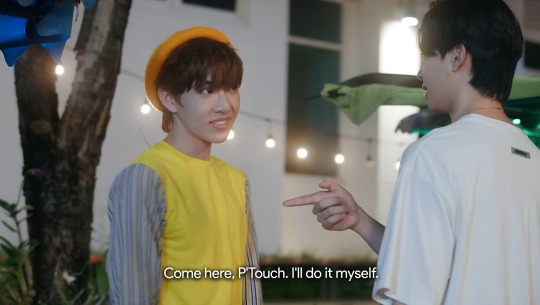
Daisy from SCOY
Surprising no one, I, a trans person, relate to Daisy. They're outgoing and seemingly don't care about how people view them. They know they're visibly queer and they normally don't mind it (from what I see). But at the end of the day, society does affect them. They're hesitant to believe Touch genuinely cares and is attracted to them despite Touch being an absolute green flag who is very direct with his flirting. Even after, Daisy was worried about people would view their relationship with Touch and tried to become Day, a more masculine version of themself. Impossible of course and they broke down emotionally exhausted. I feel that so much because I also don't believe it when people, especially cis gay men, are attracted to me. I've caught myself trying to change my behavior to be more masculine (as I'm a bit on the nonbinary side of things). It's bad, but I know how Daisy feels.

Wang from 180 Degree Longtitude Passes Through Us
As a 26 year old trans gay immigrant in a country that doesn't want me, I have a shit ton of pent up anger that has been building up since I was a child. I've calmed down over the years, but I can still be stubborn and argumentative when it comes to politics and human rights. I'm also a linguistics major, thus an academic.
Wang is so much like myself and like a lot of people around me. Like me and Wang would be close friends irl I know it. We're young and stubborn. We're angry at the older conservative people around us, too much sometimes. So he lashes out. Many of his points are correct, but they're not hitting. Partially because the people he's talking to don't want to change, partially because he himself is stubborn. People like us yearn to be free, to be ourselves and to learn. Wang has a passion for the humanities like myself. Yet he knows society really only cares about STEM fields. I've compromised and am getting a master's in computational linguistics. Even though really I just wanna learn as much as I can about sociolinguistics.
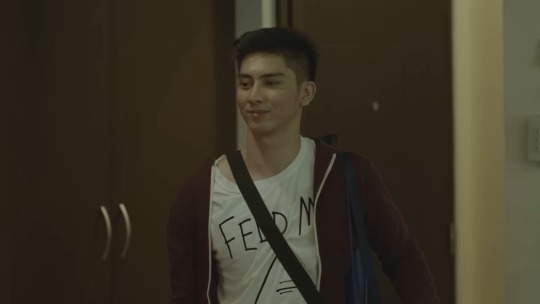
Karl from Gaya Sa Pelikula
I haven't watched GSP in a hot minute, but I do remember feeling very seen.
So in the show Karl has his gay awakening, tries to internally and externally deny it, and eventually let himself be free to feel everything and be himself (at least in private).
Now I didn't have a gay awakening, but I guess you could say a trans awakening. In middle school I felt different, I suspected maybe some flavor of LGBT, but wasn't sure and I was too afraid to think about it too hard. Come high school I secretly wanted to join the LGBT club, but was afraid. Then I was essentially adopted into the LGBT club and dragged into the friend group during lunch because I was a loner like everyone else. At the time still "identified" as a cishet woman. As time went on people started to suspect. "Why are you in the club?", "why did you cut your hair", "why do you dress like that?", "your voice is low for a girl haha", etc. Much like Karl, I was not ready for any of that. I was still struggling to make sense of it all and come to terms with it myself. So I kept rejecting it and every time it hurt.
I kept rejecting it until I couldn't. Until someone I resonated with so much came out as trans and it clicked. My trans awakening was complete. I became able to be more myself, but only in private safe spaces. I wouldn't come out and live as a man until after high school and it was terrifying.

Adachi from Cherry Magic
I've only watched the jpn ver, but I'm sure that character remains the same.
I'm anxious and used to be quite shy. Now I'm just awkward. I'm really bad at seeing the good in myself cause I feel like I'm wandering around aimlessly in life. Not that impressive. So when people compliment me I think "haha they're just being nice" (refer back to me never believing people are actually attracted to me).
Adachi is the exact same. He has the same routine every day. Just going through the motions and not really thinking anything of himself. But then Kurosawa comes along and the ability to read minds. Adachi then realizes "wait, someone I respect so much actually loves me? And thinks I have a lot of good qualities? Makes me wanna cry." And me too Adachi. I'd be the same.
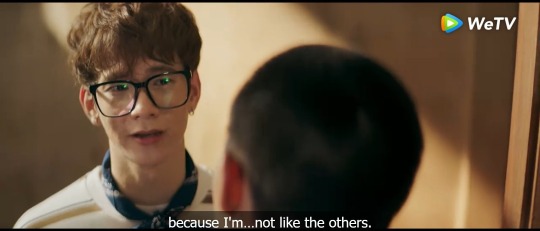
Jared from 7 Days Before Valentine
Jared, my precious baby, is described throughout the show as kind, but weird and different. We later learn that he has dyslexia, and honestly he seems to be somewhere on the autism spectrum. Even if he isn't, he has a behavioral difference people pick up on and then shun him for it.
I too was seen as kinda weird growing up. Maybe it was the autism, maybe it was the social anxiety. Probably both. And then of course there was the gnawing feeling that I was different than everyone else and it turns out it's because I'm trans.
So when Jared said that people didn't talk to him because he wasn't like other people it hit me so hard.

Myungha from Love For Love's Sake
The whole show is sad yet cathartic for me. Myungha is depressed yet spends his time comforting others. He has a hard time loving and receiving love. If you give him a fictional character who is very similar to him he will love them and see all the good, but he doesn't see it in himself. Relatable as hell.
I have an incredibly hard time being honest with my emotions and letting people love me and express attraction. Mostly in a romantic/sexual context. Dpdr is cockblocking me. So dating is hell, but I'm lonely and yearn to not be.
Probably if you put me in a situation like Myungha I'd also go "yep, that right there is my blorbo" and then not realize that all the things I like about the person and make me care about them are things I have.
Honorable mentions:
Both Akk and Ayan from The Eclipse
Nozue from Old Fashion Cupcake
Oh-Aew from I Told Sunset About You
Cher from A Boss and a Babe (I headcannon him as autistic)
Amber from DNA Says Love You
Uea from Bed Friend
Mitsuomi from Restart After Come Back Home
Jao from SCOY
Maybe I'll make another post for those later
#comment or reblog/tag who you resonate with most!!#thai bl#korean bl#japanese bl#filipino bl#bl series#secret crush on you the series#secret crush on you#180 degree longitude passes through us#7 days before valentine the series#7 days before valentine#gaya sa pelikula#like in the movies#cherry magic#love for love's sake#the eclipse#old fashion cupcake#restart after come back home#i told sunset about you#a boss and a babe#dna says i love you#bed friend the series
57 notes
·
View notes
Text
yowza this week is gonna be jam-packed with things
I can't make it to queer art studio session tomorrow morning bc I have some stuff I need to work on, but after class I'm going to the lgbtq org's vintage short film night
then wednesday evening I'm meeting up with a queer ladies' film group and we're gonna go out to dinner and then go to a public showing of a documentary together
then thursday I'm going to the lgbtq org's vent session kind of meeting where I'll probably end up crying publicly in front of other gays
and during all of this I must somehow write a hefty academic paper for my sociolinguistics class that is due next monday that knocks the socks off of my senile old professor since I want him to be my master's thesis advisor
1 note
·
View note
Text
Thanks for tagging me, this is really cool! My immediate two reactions are:
It'd take a bit of work to convince me that this is actually a pronoun and not a discourse marker.
'4th person' doesn't have a single well-established definition.
To elaborate in the wrong order, a lot of people in the notes are really really mad at calling this 4th person. Many of them simply don't believe in numbers higher than 3 at all, but others are confused because most often, 4th person is used to describe languages that don't suffer from the gay fanfic problem make a proximate/obviate distinction, but that's just because proximate/obviate is the most common additional distinction for pronouns to make (among well-studied languages). 4th person has been used as a label for first person plural, obviative, and logophoric pronouns in various langauges (Siewierska, 2004, p. 7). So there's absolutely no issue at all calling 'imaginary-audience 4th-wall break' 4th person, and I think roach-works justifies well why a label other than 2nd person should be used.
I must admit I don't have any experience with this use of chat, but the examples I’ve seen in the notes don’t look to me like pronouns. Compare these:
Chat, is this real? Hey, chat, what’s happening? Chat keeps giving me bad advice (from wizard-of-docs in the notes)
with examples from Cheshire (2013) of man as a pronoun:
before I got arrested man paid for my own ticket to go Jamaica you know
as a pragmatic marker:
aah man that’s long that’s kind of long
and as a noun:
I’m about to show you man how to get a woman
The first two examples for chat are quite clearly discourse markers¹ vocatives, but wizard-of-docs’ example is ambiguous whether it’s a noun or a pronoun. I think that’s great reason to look further into whether chat is developing as a new pronoun (especially having read how the varied pragmatic functions of the noun man contributed to its development as a pronoun), but not a good reason to go around saying that it is a pronoun before that analysis has been done².
It seems vocatives are only sometimes considered discourse markers (Fraser, 1990)—pragmatics is even more complicated than I already thought—but regardless of how you categorise them, vocatives obviously function primarily to manage the flow of discourse, and do not function as pronouns.
It being fun to say “Chat is a 4th-person pronoun” is a better (but still not good enough for me personally) reason to go around saying it, though.
Cheshire, J. (2013). Grammaticalisation in social context: The emergence of a new English pronoun1. Journal of Sociolinguistics, 17(5), 608-633. https://doi.org/10.1111/josl.12053
Fraser, B. (1990). An approach to discourse markers. Journal of Pragmatics, 14(3), 383-398 https://doi.org/10.1016/0378-2166(90)90096-V
Siewierska, A. (2004). Person. Cambridge University Press. https://doi.org/10.1017/CBO9780511812729
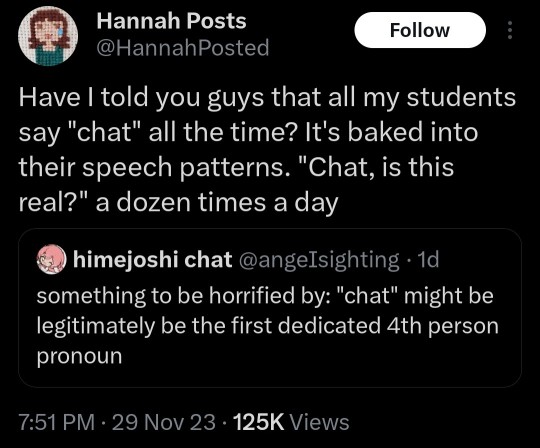
#linguistics#pronouns#I take a bit of issue that 4th-wall breaks should 'never be done' in opera and musicals#many songs in musicals and opera break the 4th wall at least a little bit#i mean what else do you call pausing time to sing (and dance) about your feelings#sometimes directly to the audience#and I feel like most musicals I've seen have had at least a little 4th wall breaking beyond that#though i cant be sure how much is in the book vs was added by that production#Thanks again Moss for making sure I saw this. You can bet I'll be listening out for this in the future
138K notes
·
View notes
Text
@ gays and straights:
how do you feel about the term “partner” when it is used as a synonym for boyfriend/girlfriend/significant other?
I hate it. Like not only would I personally never use it, I would never want to be called it and I cringe when I hear people use it.
I feel like it is almost diminutive (not in a grammatical sense), like it’s less real or serious than the other terms for the same thing.
Like if I was in a relationship and someone, knowing I was gay, asked, “do you have a partner?” I would be like “yah, I have a boyfriend” like.... boys can have boyfriends
I do not see the purpose of the word partner please give me all your thoughts
61 notes
·
View notes
Text
"love the data, hate the interpretation" is 21st cent "hate the sin love the sinner"
#hdlagekshs#me reading sociolinguistics slhwkzwuwksh#djaljzkq#also this is not. a hamilton reference i grew up gay and catholic n the early 2000s lol
3 notes
·
View notes
Text
“I’m Screaming:” The Semantic Typology of Keyboard Smashes and their Assigned Sociopolitical Identities in the Gay Community
95 notes
·
View notes
Text
Smarter and more interesting people than me have certainly written entire books on this kind of sociolinguistic phenomenon. It's a very common pathway.
I can posit a guess as to this path and why it occurs though:
Black women > black gay men, a group who often identify more with women in their life > white gay men, who often identify more with other gay men than other white men > the queer community in general, who tend to value in-group identification > young queer kids learning about themselves and expressing this identity they now understand > kids in general who will jump on any and every trend because they love learning and fitting in.
It doesn't always go through the gay community, but plenty of terms that started as AAVE get labelled "gay slang", and a lot of those terms go on to be considered "youth slang".
Language is kind of a thing that just happens subconsciously, so it's not a deliberate theft. What it is is an attempt at expressing identity and in-group identification, but it mutates at each step as to who the people saying it believe they're identifying with. The way we talk is directly tied to how we are or want to be perceived.
I'm hardly an expect- refer to the books written by smarter and more interesting people. I just like linguistics!
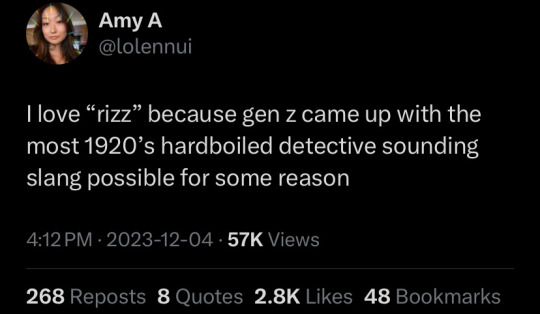
#i get why non linguists call it appropriated or stolen#but all languages ever are just copying!!#you copied your parents in order to speak at all!!#most of english is appropriated or stolen french#latin and greek#sometimes it goes up power structures and sometimes it goes down#or across#but no white child sat down and said today i will find black slang to plagiarise#no#at every step people thought: someone i think is cool said this word#i wanna be cool like them#or i want to show everyone that im with them and i am like them#its not malignant it comes from LOVE!!!#the racism is from the lack of recognition of aave in the first place#and the fact that it isnt respected enough to be recognised as a proper dialect people can understamd#not that its words spread to other dialects#that part is just linguistics baby
50K notes
·
View notes